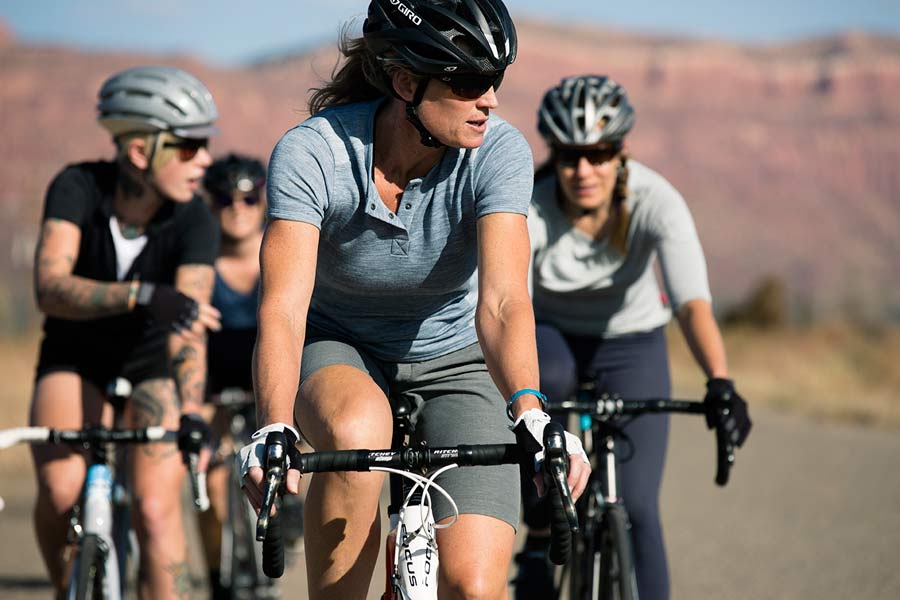I. Introduction

A. Importance of cycling for women’s health and empowerment:
Cycling is not only a great form of exercise but also holds significant benefits for women’s health and overall empowerment. By highlighting the importance of cycling for women, this article aims to encourage women to embrace cycling as a means to improve their well-being, boost their confidence, and challenge societal norms.
B. Overview of the benefits covered in the article:
The article will explore the wide range of benefits that cycling offers for women. These benefits can be classified into three main categories: physical health, mental and emotional well-being, and empowerment and personal growth. The subsequent sections will delve into each category, outlining specific benefits and their impact.
II. Physical Health Benefits
A. Cardiovascular fitness and weight management:
- Enhancing heart health and reducing the risk of cardiovascular diseases: Cycling is an excellent aerobic exercise that strengthens the heart and improves cardiovascular fitness. It helps lower blood pressure, reduce cholesterol levels, and decrease the risk of heart diseases such as heart attacks and strokes.
- Effective calorie burn and weight management: Regular cycling can contribute to weight loss and weight management. It is a low-impact exercise that burns calories and helps maintain a healthy body weight. Cycling also boosts metabolism, aiding in the reduction of body fat.
B. Strength and muscle tone:
- Building lower body strength and toning leg muscles: Cycling primarily engages the lower body muscles, including the quadriceps, hamstrings, and calf muscles. Regular cycling leads to increased leg strength and muscle tone, resulting in toned and defined leg muscles.
- Engaging core muscles for balance and stability: Cycling also involves the activation of core muscles, including the abdominal and back muscles, to maintain balance and stability while riding. By strengthening these muscles, cycling improves core stability and posture.
C. Joint and bone health:
- Low-impact nature of cycling for reduced strain on joints: Compared to high-impact exercises like running, cycling is a low-impact activity that puts minimal stress on the joints. It is particularly beneficial for individuals with joint conditions or those looking for a joint-friendly exercise option.
-
Promoting bone density and preventing osteoporosis: Cycling is a weight-bearing exercise that helps improve bone density and strengthen bones, reducing the risk of osteoporosis. It is especially important for women as they are more prone to developing osteoporosis with age.
III. Mental and Emotional Well-being
A. Stress reduction and mood enhancement

- Release of endorphins for improved mood and reduced stress: Cycling stimulates the release of endorphins, often referred to as the “feel-good” hormones. These natural chemicals in the brain help improve mood, reduce stress, and provide a sense of well-being. Regular cycling can serve as an effective way to manage stress, improve mental resilience, and promote overall mental health.
- Opportunity for mindfulness and relaxation: Cycling offers an escape from the demands and pressures of daily life. Whether cycling through scenic routes or engaging in mindful cycling practices, such as focusing on breathing and being present in the moment, this activity allows women to disconnect from stressors and gain a sense of mental clarity. It provides an opportunity for relaxation, rejuvenation, and mindfulness.
B. Increased confidence and self-esteem
- Achieving personal fitness goals and boosting self-confidence: Engaging in regular cycling allows women to set and accomplish personal fitness goals. As they witness improvements in their strength, endurance, and overall fitness levels, it boosts their self-confidence. Overcoming physical challenges on the bike builds a sense of achievement, empowering women to believe in their abilities.
- Overcoming challenges and gaining a sense of empowerment: Cycling presents various physical and mental challenges, including conquering hilly terrains, tackling long distances, or participating in competitive events. Successfully overcoming these challenges fosters a sense of empowerment. Women learn to push their limits, embrace resilience, and develop a mindset of persistence, all of which translate into increased self-esteem and confidence in other areas of life.
C. Social connections and community engagement

- Joining cycling groups for camaraderie and support: Cycling offers opportunities for social connection and camaraderie. Women can join local cycling groups, clubs, or organizations that foster a sense of community. These groups provide support, encouragement, and a platform to meet like-minded individuals who share a passion for cycling. The shared experience creates lasting friendships and a supportive network.
- Participating in charity rides and events for community engagement: Cycling events, such as organized rides or charity events, provide a chance for women to engage with their communities and make a positive impact. Participating in these events not only helps raise awareness and funds for a cause but also creates a sense of camaraderie, belonging, and social connection. It enables women to contribute to the greater good while enjoying the benefits of cycling.
IV. Empowerment and Personal Growth
A. Independence and freedom

- Ability to travel independently and explore new places: Cycling empowers women with the independence and freedom to explore new places and travel at their own pace. It allows them to discover hidden gems, picturesque landscapes, and cultural attractions that might go unnoticed when traveling by other means. Cycling promotes self-reliance, encouraging women to rely on their own skills and decision-making while enjoying the freedom to explore.
- Confidence in one’s own physical abilities and self-reliance: As women gain experience and improve their cycling skills, they develop confidence in their physical abilities and become self-reliant. The ability to navigate different terrains, handle various weather conditions, and overcome challenges on the road instills a sense of empowerment and self-assurance. This newfound confidence extends beyond cycling and positively impacts other areas of life.
B. Overcoming societal barriers
- Breaking gender stereotypes and defying societal expectations: Cycling provides an avenue for women to break free from traditional gender stereotypes and defy societal expectations. By participating in a sport often dominated by male representation, women challenge gender norms, showcase their skills, and inspire others to pursue their passions, regardless of societal barriers or expectations.
- Inspiring and empowering future generations of female cyclists: As women actively participate in cycling, they become role models for younger generations. By breaking down barriers and pursuing their interests, female cyclists inspire and empower future generations of women to embrace their individual passions, challenge stereotypes, and strive for their personal goals.
V. Conclusion
In conclusion, cycling offers numerous benefits for women, extending beyond physical fitness. By engaging in this empowering activity, women experience improved mental and emotional well-being, increased confidence and self-esteem, and meaningful social connections. Cycling promotes empowerment, personal growth, independence, and the ability to break societal barriers. It serves as a source of inspiration for future generations of female cyclists, fostering a sense of camaraderie, resilience, and confidence. Women, through cycling, find not only improved physical health but also strength, inspiration, and empowerment that positively impact various facets of their lives.

